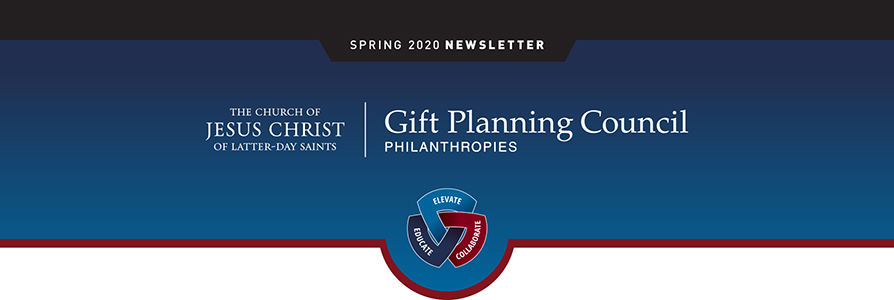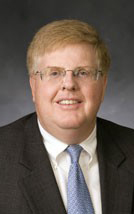
Gift Planning Services Manager’s Minute

Spring Cleaning
The custom of performing a thorough spring cleaning is ingrained in many cultures. A thorough spring cleaning is reputed to increase productivity and help reduce stress. Spring cleaning can also be a thought of as a metaphor for taking the time to review our professional practices and noting where we can gain additional knowledge and skills. We encourage you to utilize the resources provided by the Gift Planning Council (GPC) and Gift Planning Services of the Philanthropies Department to assist you in this process. Please take a few minutes to visit the Gift Planning Services website and review the wealth of information it contains, including whiteboard videos, legal language, Gift Planning Council Conference archives, etc.
We welcome Todd Hallock, attorney at law, as he begins his term of service as chair of the Gift Planning Council! Todd has ably served the GPC as vice-chair. Todd is the consummate professional with exquisite technical ability who also understands the all-important intangible issues involved with estate and charitable planning. He genuinely understands how charitable giving blesses the lives of donors and recipients alike. We are grateful for Todd and his service and look forward to his leadership as GPC chair.
At this time, we are also pleased to welcome Stan Leavitt, CFP, as he begins his term as vice-chair of the GPC. Stan hails from the Sacramento area where he serves as a private wealth advisor and managing director of FuturePoint Wealth Advisors, a private wealth advisor practice of Ameriprise Financial Services, Inc. Stan has been a wonderful friend and champion of the GPC for many years. He brings to the GPC a wealth of experience counseling with families and delivering sophisticated financial, tax, and investment management services.
We are grateful to have Stan join Todd in providing leadership to the Gift Planning Council. I urge you to make their acquaintance.
In closing, since it’s never too early to be planning to attend the next biennial Gift Planning Council Conference, may I please encourage you to save the date of November 11-12, 2021, for our next gathering in Salt Lake City, UT. We hope you can join us!
Happy Easter!
Kindest regards,
David Bonner
LDS Business College (Ensign College) Highlight
Big news for LDS Business College! Starting September 1, 2020, it will change its name to Ensign College. While the name is changing to reflect President Nelson’s charge to honor the name of the Church, the great things happening on campus remain the same. To learn more about the market-driven, skills-based education available at LDS Business College, visit the LDSBC page.
The SECURE Act
The Setting Every Community Up for Retirement Enhancement Act (SECURE Act), passed the House of Representatives on May 23rd, 2019, and appeared to be on a quick path for enactment before delays in the Senate caused it to sit idle for six months, and become less certain. On December 19, 2019, the bill was ultimately approved by the Senate as part of a larger government budget appropriations act. The next day, December 20th, 2019, the President signed the SECURE Act into law, and it became effective on January 1, 2020. The SECURE Act is one of the most significant acts of legislation affecting retirement accounts in several years, resulting in key changes with respect to retirement account rules and planning. Those changes include the following:
Penalty-free Withdrawals for Qualified Birth or Adoptions. Under the prior law, an individual could not take distributions from their IRA until 59.5 years of age without paying a penalty on the amount drawn, with several notable exceptions including: large medical bills, disability, first home purchase and higher education expenses. The SECURE Act provides additional exceptions allowing for penalty-free withdrawals of up to $5,000 by each parent for qualified birth or adoption expenses.
Changes to Employee Eligibility and Employer Offerings for 401(k) plans. Under the prior law, part-time employees were required to work at least 1,000 hours per year to qualify for and contribute to a 401(k) plan, resulting in a restricted number of participants. The SECURE Act provides an alternative qualifying path, allowing long-term part-time employees who work at least 500 hours in a 12-month period for at least three consecutive years and are at least 21 years of age to contribute to a 401(k) plan. Additionally, the SECURE Act now provides additional tax credits to employers who set up automatic enrollment in 401(k) plans for employees. The hoped-for result is that small businesses that previously found it too costly to initiate 401(k) plans, will be incentivized to do so.
Age Cap on Contributions Repealed. The SECURE Act repeals the prohibition of making contributions to an IRA account by individuals who are 70 ½ years or older. Individuals can now make tax-deductible contributions to their IRA accounts for as long as desired, which may particularly benefit those who continue to be employed beyond traditional retirement age. Note: while tax-deductible contributions made to an IRA after age 70 ½ are now allowed, the amount that may be excluded from income for a later-made Qualified Charitable Deduction (QCD) may be affected. Donors and clients should be advised to consult with their tax advisor for more information about potential tax and income consequences when considering an IRA QCD.
Increases the Starting Age for Required Minimum Distributions from IRA Accounts from 70 ½ to 72 years old. The SECURE Act adjusts the required beginning date for required minimum distributions from 70 ½ to 72 years of age, allowing for an additional 18 months of tax-deferred growth for those who do not need the immediate additional income. The previous beginning age of 70 ½ years old was based on life expectancies in the early 1960s and the change reflects longer anticipated life expectancies in the United States today.
Withdrawals from IRAs or Defined Contribution Plans by Beneficiaries Must be Made Within 10 years. One of the more significant changes of the bill affects the timing of beneficiaries in taking distributions from inherited retirement accounts. Under the prior law, beneficiaries of inherited retirement accounts could stretch out distributions over their life expectancy. The SECURE Act now requires most non-spouse beneficiaries to take distributions from an inherited IRA or defined contribution plan within 10 years following the death of the account owner, thereby eliminating the ability to stretch out distributions over their expected lifetime. This change will impact retirement planning for beneficiaries who may now find themselves with higher income tax obligations as a result of larger required distributions in a shorter time frame. There are several notable exceptions to the 10-year distribution requirement provided in the SECURE Act, including, for: the surviving spouse of the account owner, disabled or chronically ill individuals, individuals who are not more than 10 years younger than the account owner, and children of the account owner who have not reached the ages of majority. In light of these changes, your clients may want to consider reviewing their IRA or qualified contribution plan beneficiaries and determining whether any changes to named beneficiaries is advisable.
The SECURE ACT was passed with bipartisan support and represents a significant effort to effect positive change in retirement planning. However, the extent to which the various changes may benefit or require adjustment to individuals' retirement plans and goals will depend on their circumstances. Donors, clients, and others should consult with their own tax advisors for specific legal and/or tax advice regarding the SECURE Act and its impact on their retirement outlook.
Michael Rasmussen Spotlight
One of the wonderful members of our Gift Planning Council is Michael Rasmussen. We are excited for you to get to know him a little better in this edition of the GPC Spotlight!
1. Please share a bit of your background and your practice.
I am a BYU graduate and hold a law degree from the University of Utah. With that said, I bleed blue!
A true highlight of my life was the opportunity to serve in the Japan Nagoya mission as it has become a springboard to everything good that I have experienced in my life.
I am a native of Las Vegas, Nevada and have been practicing law here for 20 years. I am a partner with Hutchison & Steffen and my practice is focused on transactional law, including estate and asset planning, protection, and preservation, as well as overseeing large and complex real estate matters.
Prior to joining my current firm, I served as an in-house counsel with the largest homebuilder in the nation and oversaw property acquisitions and merger opportunities.
When I am away from the office I am blessed with the company of a wonderful wife, Rebecca, and five children.
2. Why you are involved with the Gift Planning Council? (Read more)
COVID-19 and Philanthropies
Due to the current COVID-19 (novel coronavirus) situation, Philanthropies has temporarily restricted access to our offices for the public through at least April 3, 2020. The Gift Planning Services team will be working from our homes, so please feel free to continue reaching out to us through our normal phone numbers and e-mail addresses. We hope you, your families, and your clients will continue to be safe and healthy. You are in our thoughts and prayers!
Referrals!
If you have friends or colleagues that would benefit from receiving this newsletter or other Gift Planning Council correspondence, please contact David Smith at davidj_smith@ChurchofJesusChrist.org or 801-356-5251.
Contact Us
For a detailed discussion of the services we provide you and your advisors, please contact us at 1-877-650-5377 or by email.